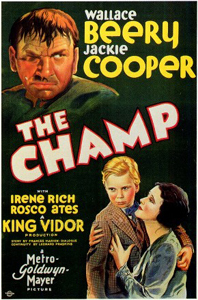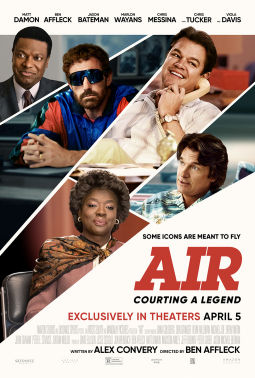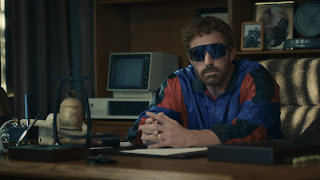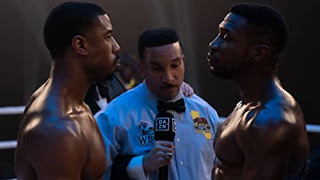F1: THE MOVIE
"Slow is smooth. Smooth is fast". This was the mantra that the lead character's father would live by when it came to racing. F1: The Movie follows this mantra. Perhaps a bit longer than it should be, F1: The Movie still has enough in terms of story and visuals to make for a great viewing.
Sonny Hayes (Brad Pitt) still races, but the former elite racecar driver is now a vagabond in the racing world. Living in his van, he goes for almost any kind of race that piques his interest. Sonny in turn has no interest in joining any company or organization. Sonny appears to like his life as a wanderer, but it looks like the world has passed by the former racing wunderkind who once raced along legends like Ayrton Senna.
That changes when his former fellow F1 driver Ruben Cervantes (Javier Bardem) finds Sonny. Ruben now owns the APXGP F1 team and asks Sonny to come work for him. He needs an experienced driver both for the team and to mentor his young hotshot driver, Joshua Pierce (Damson Idris). Cervantes is in desperate need to win at least one of the remaining F1 Grand Prix races, otherwise he will be forced to sell the team. The board is eager to dump this losing team, with only Peter Banning (Tobias Menzies) the sole supportive board member This concerns Pierce, who worries that he will not be hired by any other F1 teams due to his relative inexperience. This also concerns the APXGP team itself, who fear for their jobs and careers.
APXGP technical director Kate McKenna (Kerry Condon) left her career at NASA to engineer an F1 vehicle that would all but fly. However, the experienced and grizzled veteran knows that the problems lie in part with the car. They also lie with the driver. Pierce is dismissive of this old man coming to teach him anything, though "J.P."'s mother Bernadette (Sarah Niles) does say that Sonny is a handsome man. The battle between Joshua and Sonny continues, as does their mutual struggle to win a race.
Sonny knows all the tricks of the trade, which he uses to push APXGP onwards. Joshua, at first contemptuous, finds that Sonny's experience may be helpful. Sonny, for his part, slowly embraces newer techniques in racing. That is not to say that there aren't major stumbles along the way. Horrific crashes, accusations of illegal mechanical alterations, unreported injuries and a secret enemy inside APXGP all work against the team. Will Sonny find any victory at the end of the finish line? Will rookie Joshua get his own?
In many ways, F1: The Movie plays a bit like another film from director Joseph Kosinski, screenwriter Ehren Kruger and producer Jerry Bruckheimer. There is the experienced and still attractive veteran, seen as an antique by the young man he will mentor. There is the rookie, looking for his place in the sun who goes from dismissive to embracing of said veteran. A love interest for the veteran, wise and professional, but still not above mixing business with pleasure. The older man advising the younger man to focus on the job and not on outside noise. Thrilling action sequences that are visually spectacular. There are more than passing resemblances between F1: The Movie and Top Gun: Maverick. The former hits many of the same notes as the latter with few differences.
Perhaps the biggest difference between F1: The Movie and Top Gun: Maverick is that the former features cameos from racers such as Sir Lewis Hamilton and Charles Leclerc, along with DJ Tiesto (briefly scene at a Las Vegas party that Joshua and his agent go to). Hamilton is one of the film's producers. In some ways, F1: The Movie is a bit too "insider", so many of the cameos will go over viewers who know next to nothing about Formula One. If not for my knowledge of Ayrton Senna, I would be even more lost when it comes to the minutia the film has.
This does not take away from a person's enjoyment of F1: The Movie. It is, however, a warning that those who do not follow F1 will not get some references and may be a little lost on its rules and procedures. The film does its best to fill us in, but there is a risk that some will not be as fully invested in the racing.
Fortunately, the screenplay gives us characters that people will care about. This is one of Brad Pitt's best performances. Sonny is someone who by the end is still a mystery, perhaps to himself. The film ends with him going to a low-level race to offer his services. Told that there is little money, he tells them that it's not about the money. What is it about, he is asked. Sonny merely laughs softly, and the film closes (we do see scenes of him in this dune race during the credits). Sonny knows racing, trusts the old methods, and is aware of Joshua's skills. He also seems eerily content with some of his poor decisions. This is a complex man. I would not say that he is filled with regret over never achieving what his skills and potential could have made him. I would say that he is resigned to it. Pitt has a wonderful monologue near the end when he talks about his life and his life in racing. It is quite and natural, making Sonny Hayes a person and not a character.
Idris too does well as Joshua Pierce. In other films, Joshua may have been merely a cocky figure. However, Idris made him someone who also worried about his own career, who went through a traumatic experience and grew from it. Bardem had a great enthusiasm as Ruben, who was both friend and businessman. Condon made Kate into an intelligent woman, capable and aware of her position as one of the few women in this male-dominated business. I am not surprised that a romance did eventually come. I think that is not a dealbreaker but not something that I eager for.
Kruger's screenplay (from a story by Kruger and Kosinski) has some great moments. One of the APXGP team asks what another is looking at in the distance. Ruben says, "We look to the future", and then see that the crewman sees Sonny Hayes coming down. It is a nice bit to have "the future" be the past.
The film uses music quite well. There is Hans Zimmer's score, a strong sense of electronica that pulsates and pushes the various racing scenes. The selected songs also fit the scenes. We hear Chris Stapleton, for example, sing Bad as I Used to Be when Sonny takes his first APXGP test drive. It does underscore Sonny's manner on the track and in life. Perhaps this is a bit too on-the-nose, but I thought it worked.
What did not work all that well were at least three parts. One was the romance, which I expected. It was again not terrible but not original. Also not original was the identity of the APXGP member who tried a last-minute sabotage. I figured out the machinations before they were revealed. The last part was the film's length. At about two-and-a-half hours, it does drag around the midpoint.
F1: The Movie is about those who find passion in their work. It has some spectacular racing sequences, some of which will make you sit up and take notice. Well-acted and written overall, one does not have to know much about Formula One to enjoy F1: The Movie, one of the best films of the year.
.png)
























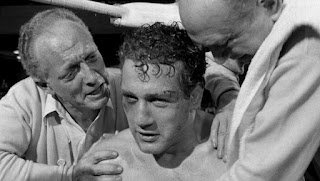
.jpg)



